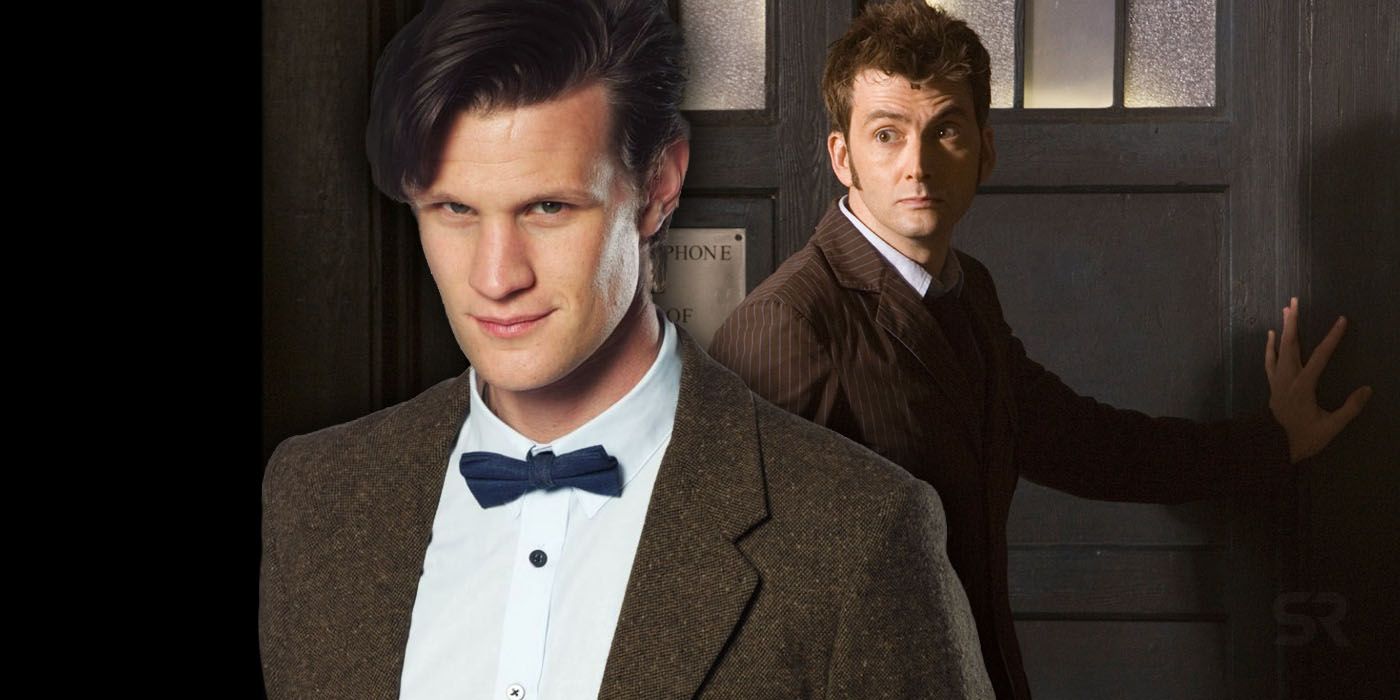The Tenth Doctor’s (David Tennant) final moments are one of the most controversial scenes in Doctor Who’s history, but Steven Moffat’s tenure as show-runner improved the meaning of those famous last words. A decade ago, the Russell T. Davies era – which had revitalized Doctor Who for modern audiences – drew to a close in the famous “The End of Time” story line. This epic two-parter not only brought the Time Lords back (albeit briefly) and unveiled the mystery behind the Master’s (John Simm) drumbeat, it also depicted the demise of David Tennant’s beloved incarnation of the ancient, time travelling alien.
Click the button below to start this article in quick view.
However, while fans were generally saddened by Ten’s passing, many have taken issue with how his story ended. Indeed “The End of Time” has long been criticized for its drawn out ending, as the Tenth Doctor slowly bids farewell to his each of his era’s companions prior to his tearful regeneration in the TARDIS. The serial’s critics have highlighted that this excessiveness is summarized by the Doctor’s conclusive sob of “I don’t want to go.”
It’s certainly a tear-jerking last line that is in keeping with the Tenth Doctor’s passionate persona, and it is so effective due to Tennant’s heartfelt delivery. But while its intention was to clearly double as a bittersweet, metatextual farewell on behalf of the departing Davies and Tennant, many Who enthusiasts thought that, in this moment, the Doctor was too attached to his current incarnation and that this intense reluctance to change was not in keeping with the Tenth Doctor’s predecessors, or the tone of his wider mythos. Fortunately, Steven Moffat’s later episodes have recontextualized the situation of Ten’s swansong, especially where Time Lord life spans are concerned.
This Time Lord ability to radically heal from catastrophic injuries has been a longstanding fixture of Doctor Who, and the Doctor had undergone it many times before – but the process does have its limits. It’s described as an unnerving, painful and fallible experience, which can only be undergone twelve times. Significantly, this rule of Time Lords having thirteen faces/lives lingered across Doctor Who canon for years, and it was not outright confirmed until Moffat’s “The Time of the Doctor,” which settled the debate once and for all.
During a seasonal special, an increasingly wizened Eleventh Doctor (Matt Smith) reiterated this regenerative catch to Clara (Jenna Coleman) and lamented that he would not survive his next death. Though he is referred to (in universe and in reality) as only the Eleventh Doctor, one of the Time Lord’s faces had been his secretive War incarnation (John Hurt), and another iteration had been lost when the Tenth Doctor aborted his transformation during “Journey’s End.” The Doctor had been shot by a Dalek and began to change in “The Stolen Earth”, but it transpired that he only wanted to heal himself, thus he swiftly siphoned off the regenerative energy into his preserved severed hand.
In light of these retcons, the Tenth Doctor’s final words become even more meaningful, since they lament not just his upcoming change into the Eleventh Doctor, but his transition into what he fears will be his last ever life before a final death. Moreover “The Day of the Doctor” anniversary special (also written by Moffat) even showed that the Tenth Doctor was aware of his prophesized death on Trenzalore, since he argued that it wasn’t “supposed to happen” in the way that the Eleventh Doctor had foreseen. Though the crossing of the timelines obviously prevented him remembering that conversation, it’s still very likely that Tennant’s Doctor would have still known what awaited him in the near future.
Moreover, both his aborted regeneration and the advent of the War Doctor occurred prior to his change in “The End of Time,” meaning that the Doctor would have been aware of how many times he could regenerate by that point anyway. Certainly, Ten’s glum assessment that “some new man goes sauntering away and I am dead” has taken on quite a different meaning about Moffat’s 2013 specials.
Of course we now know that this foretold demise did not come to pass. “The Time of the Doctor” saw the Time Lords grant the Doctor a new regenerative cycle, which allowed him to exceed the usual limits and enjoy new adventures as both the Twelfth and Thirteenth Doctors (Peter Capaldi and Jodie Whittaker respectively) with the possibility of eleven more incarnations to experience. In short, thanks to Moffat’s ratifying of regeneration rules – and the order of the Doctor’s lives – the Tenth Doctor’s conclusive scenes are strengthened by the wider Doctor Who mythos and the sequence gains an even greater emotional heft than it had possessed before.
